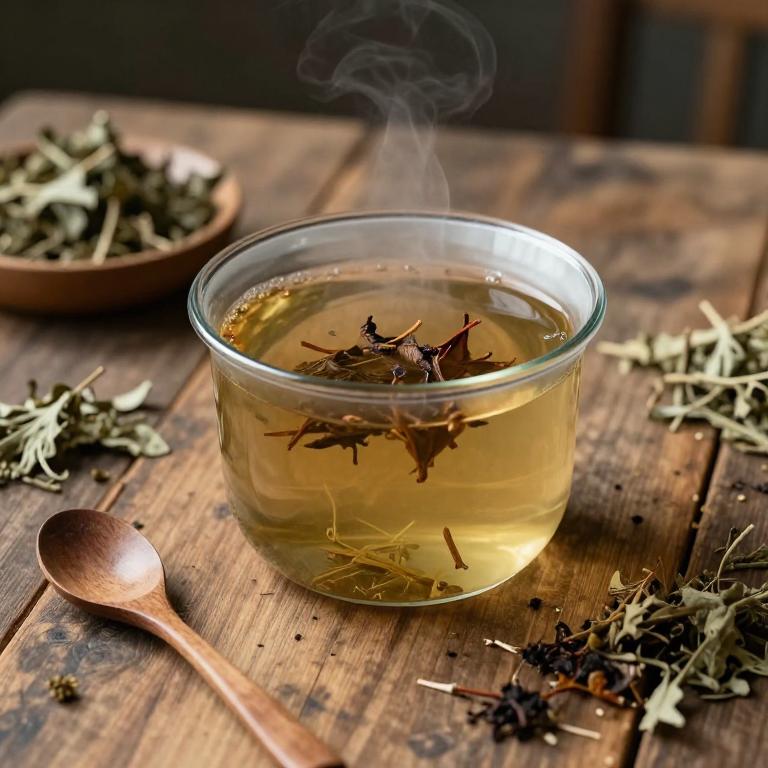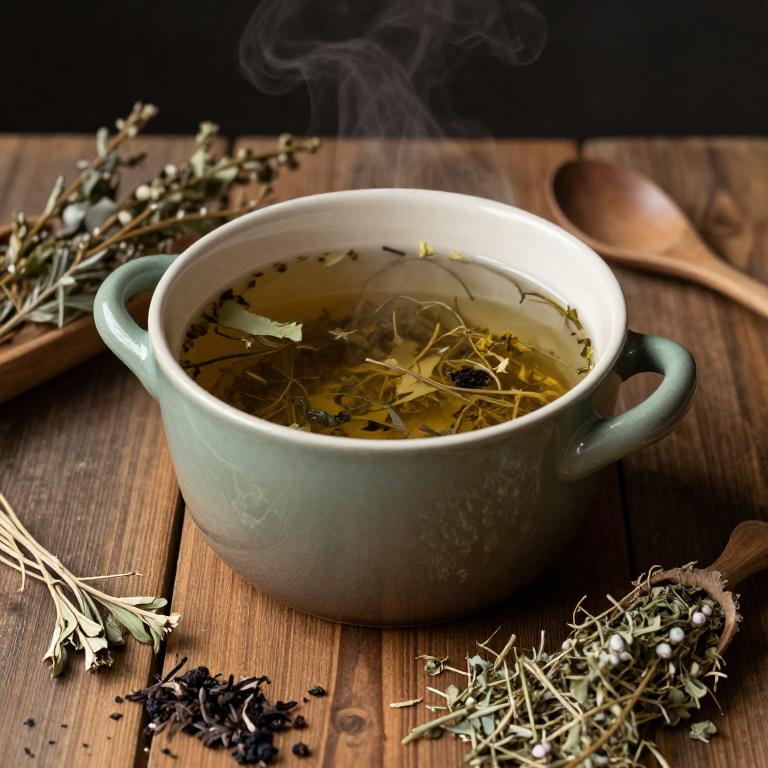10 Best Herbal Decoctions For Mouth Ulcers

Herbal decoctions have been traditionally used to alleviate the discomfort of mouth ulcers due to their anti-inflammatory and antimicrobial properties.
Commonly used herbs include licorice root, chamomile, and sage, which can be prepared by simmering dried plant material in water to create a soothing liquid. This decoction can be applied directly to the ulcer or used as a mouth rinse to reduce pain and promote healing. The warm liquid helps to cleanse the mouth and create a protective barrier over the affected area.
Regular use of such decoctions may shorten the duration of ulcers and prevent further irritation.
Table of Contents
- 1. Aloe vera (Aloe barbadensis)
- 2. Marigold (Calendula officinalis)
- 3. St. john's wort (Hypericum perforatum)
- 4. Licorice (Glycyrrhiza glabra)
- 5. Stinging nettle (Urtica dioica)
- 6. Echinacea (Echinacea purpurea)
- 7. Ginger (Zingiber officinale)
- 8. Anise (Pimpinella anisum)
- 9. English lavender (Lavandula angustifolia)
- 10. Peppermint (Mentha piperita)
1. Aloe vera (Aloe barbadensis)

Aloe barbadensis, commonly known as aloe vera, has been traditionally used for its soothing and healing properties, including in the form of herbal decoctions for mouth ulcers.
These decoctions are prepared by simmering the gel or leaves of the aloe plant in water, creating a nutrient-rich liquid that can be applied directly to the affected areas. The anti-inflammatory and antimicrobial properties of aloe vera help reduce pain, swelling, and infection risk in mouth ulcers. Its ability to promote tissue repair makes it an effective natural remedy for accelerating the healing process.
While generally safe, it is important to ensure proper preparation to avoid irritation or adverse reactions.
2. Marigold (Calendula officinalis)

Calendula officinalis, commonly known as garden marigold, has been traditionally used for its anti-inflammatory and antimicrobial properties, making it a valuable herb in the treatment of mouth ulcers.
Herbal decoctions made from dried calendula flowers are prepared by simmering the flowers in water, creating a soothing liquid that can be applied directly to the affected areas. This preparation helps reduce pain, inflammation, and the risk of infection in mouth ulcers due to its high content of flavonoids and triterpenes. The mild, pleasant taste of calendula decoctions makes them more palatable for regular use, enhancing patient compliance.
While generally safe, it is advisable to consult a healthcare professional before using calendula for persistent or severe mouth ulcers.
3. St. john's wort (Hypericum perforatum)

Hypericum perforatum, commonly known as St. John's wort, has been traditionally used for its anti-inflammatory and antiseptic properties, making it a potential remedy for mouth ulcers.
When prepared as a herbal decoction, it involves boiling the dried leaves and flowers in water to extract its active compounds, such as hypericin and hyperforin. This decoction can be used as a mouth rinse or applied directly to the affected area to soothe pain and promote healing. Its antimicrobial effects may help reduce infection risk in ulcers, while its anti-inflammatory action can alleviate irritation.
However, it is important to consult a healthcare professional before use, as St. John's wort can interact with certain medications.
4. Licorice (Glycyrrhiza glabra)

Glycyrrhiza glabra, commonly known as licorice root, has been traditionally used in herbal medicine for its soothing and anti-inflammatory properties.
Herbal decoctions made from licorice root are often prepared by simmering the dried root in water to extract its active compounds, such as glycyrrhizin and flavonoids. These decoctions can be used as a gargle or applied topically to mouth ulcers to alleviate pain and reduce inflammation. The licorice root's ability to promote tissue repair and inhibit microbial growth makes it a valuable remedy for oral ulcers.
However, long-term use of licorice decoctions should be monitored due to potential side effects such as hypertension and electrolyte imbalances.
5. Stinging nettle (Urtica dioica)

Urtica dioica, commonly known as stinging nettle, has been traditionally used in herbal medicine for its anti-inflammatory and healing properties.
A decoction made from the leaves and stems of Urtica dioica can be prepared by boiling the dried plant material in water for several minutes. This herbal decoction is believed to help soothe the pain and reduce the inflammation associated with mouth ulcers. The high concentration of minerals such as iron, calcium, and magnesium in stinging nettle may contribute to its healing effects.
While some individuals may find relief using this natural remedy, it is advisable to consult a healthcare professional before using it, especially if ulcers persist or worsen.
6. Echinacea (Echinacea purpurea)

Echinacea purpurea, commonly known as purple coneflower, has been traditionally used for its potential anti-inflammatory and antimicrobial properties.
Herbal decoctions made from Echinacea purpurea may help alleviate symptoms of mouth ulcers by reducing inflammation and promoting healing. Studies suggest that the plant's active compounds, such as alkamides and polysaccharides, can modulate the immune system and inhibit harmful bacterial growth in the oral cavity. While some anecdotal evidence supports its use, more clinical research is needed to confirm its efficacy and safety for treating mouth ulcers.
Nonetheless, Echinacea purpurea decoctions are often considered a natural remedy for managing discomfort associated with oral ulcers.
7. Ginger (Zingiber officinale)

Zingiber officinale, commonly known as ginger, has been traditionally used in herbal medicine for its anti-inflammatory and antimicrobial properties.
Herbal decoctions made from fresh or dried ginger roots can be prepared by simmering the rhizome in water to extract its active compounds, such as gingerol and shogaol. These decoctions are often applied topically to mouth ulcers to reduce pain, swelling, and infection due to their soothing and healing effects. Studies suggest that ginger may help accelerate the healing process by promoting blood circulation and reducing oxidative stress in the oral cavity.
As a natural remedy, ginger decoctions offer a safe and effective alternative for managing symptoms of mouth ulcers, though they should be used in conjunction with proper oral hygiene and medical advice when necessary.
8. Anise (Pimpinella anisum)

Pimpinella anisum, commonly known as anise, has been traditionally used in herbal medicine for its soothing and anti-inflammatory properties.
Herbal decoctions made from anise seeds can be prepared by simmering the dried seeds in water, creating a gentle infusion that is suitable for oral application. This decoction is often recommended for its ability to alleviate the pain and discomfort associated with mouth ulcers due to its mild analgesic and antimicrobial effects. The essential oils in anise, such as anethole, contribute to its healing properties by promoting tissue repair and reducing inflammation.
While it is generally considered safe for external use, it is advisable to consult a healthcare professional before using anise-based remedies, especially for prolonged or severe cases of mouth ulcers.
9. English lavender (Lavandula angustifolia)

Lavandula angustifolia, commonly known as English lavender, has been traditionally used for its soothing and anti-inflammatory properties.
Herbal decoctions made from lavender can be prepared by simmering the dried flowers in water to extract their beneficial compounds. These decoctions may help alleviate the pain and inflammation associated with mouth ulcers due to their antimicrobial and analgesic effects. The calming aroma of lavender also provides a psychological comfort that can ease the discomfort of oral sores.
While lavender decoctions are generally safe, it is advisable to consult a healthcare professional before using them, especially for prolonged treatment or in combination with other medications.
10. Peppermint (Mentha piperita)

Mentha piperita, commonly known as peppermint, has been traditionally used in herbal medicine for its soothing and anti-inflammatory properties.
Peppermint herbal decoctions can be prepared by steeping fresh or dried leaves in hot water, creating a flavorful and therapeutic tea. This decoction is often used to alleviate the pain and discomfort associated with mouth ulcers due to its cooling effect and mild antiseptic qualities. The menthol in peppermint helps to reduce inflammation and numb the affected area, promoting faster healing.
While it is generally safe for most people, individuals with certain allergies or gastrointestinal conditions should consult a healthcare professional before using peppermint decoctions regularly.